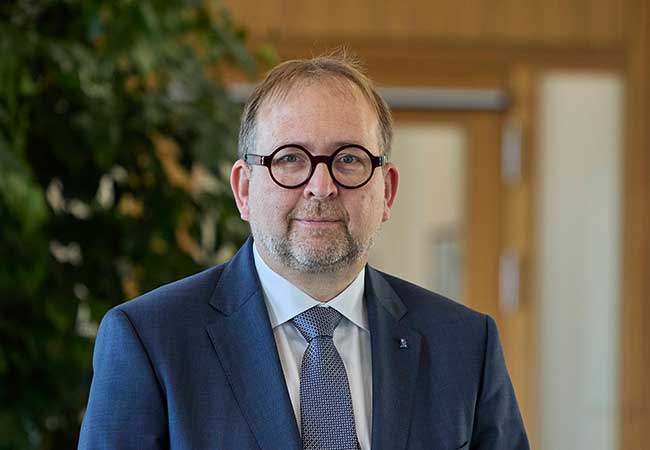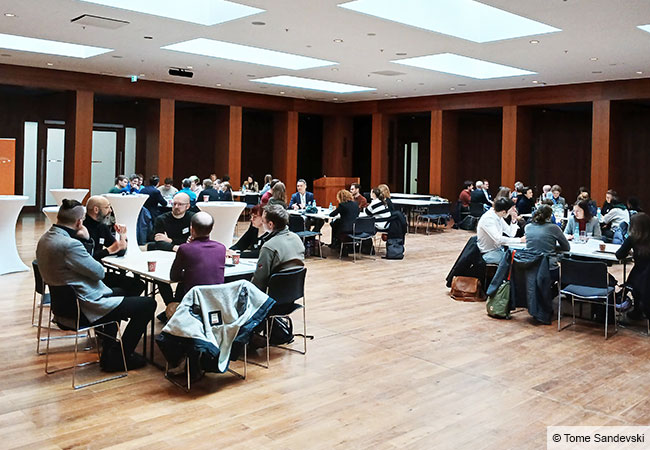By Rainer Forst
On June 18, Jürgen Habermas, who has had a lasting impact on the humanities and social sciences at Goethe University, turns 95, and our academic community, of which he is still an active member, sends its warmest congratulations. To this day, Habermas’ academic and intellectual voice is one of the most widely heard both nationally and internationally, and we sincerely hope that it will remain so for a long time to come.

We fondly remember the 90th birthday celebration organized by Normative Orders at our university, during which Jürgen Habermas delivered a major lecture, his last public one. Under the title “Once Again: On the Relationship between Morality and Ethical Life,” he reflected on the eminent philosophies of history of Kant, Hegel and Marx, connecting them to his own view. He traced the thoughts of the three towering figures, who had a strong influence on his thinking, on the question of reason in history and expressed his ultimately morally based hope that reason shall never give up striving to improve social conditions despite all the disappointments along the course of events: if only for the sake of those whose struggle for justice should not have been in vain and in view of the countless who suffer from injustice.
It is primarily Kant, whose 300th birthday we celebrated in the spring, to whom Habermas refers when he insists on the imperative to enlighten the times in which we live through the “public use of reason,” that is, through the discourse of those affected. This is his life’s theme, which runs through all of his writings: Emancipation through communicative reason, which takes upon itself the effort to recognize and overcome its own blockages, including those caused by social and systemic factors. With Hegel, Habermas demands that this project must assure itself of past learning processes to gain orientation and encouragement from them. Finally, with Marx, he insists that it is the task of philosophy and the sciences as a whole not only to improve individual and social life but also to free it from the limitations that are ideologically declared as natural and inevitable. In doing so, reason works like a “mole,” namely “through the socialized subjects’ own fallible […] learning processes.”
More than 3,000 people attended the lecture at the time. It was exemplary for the particular way in which Habermas embodies the thinking of critical theory characterizing Frankfurt University: a thinking that is theoretically comprehensively grounded in an interplay between philosophy and the social sciences and, at the same time, practically oriented without misjudging the complexity of the stages of mediation between theory and practice. Habermas’ work is also unrivaled in the sense that he conceptualized this mediation and simultaneously practices it with his public interventions. In recent years also, he has spoken out pointedly on central issues of our time – whether it is the fate of Europe, the course set in the fight against the pandemic, the war unleashed by Russia in Ukraine or the situation that has arisen, not least in Germany, following Hamas’ attack on Israel on October 7, 2023.
At the end of his memorable lecture, Habermas briefly reviewed the three periods of his academic life that he spent in Frankfurt: his time as Adorno’s assistant in the second half of the 1950s, his time as Horkheimer’s successor in his professorship in the 1960s and finally his return in the 1980s after completing his directorship of the Max Planck Institute in Starnberg. He described the last period as the “most satisfying time of my academic life” in the “free air” of Goethe University. And with a view to the present, he expressed his wish that the particular, open and critical spirit that still characterizes this university today would sprout on the new Westend campus and find its “protective niches.” We are committed to this in our work because the questions that we dealt with as students and colleagues of Habermas, especially those concerning the future of democracy, will not let us rest.
His most recent works take up these questions and give his thinking a new twist, as befits a philosophy with, as Adorno put it, a “nucleus of time.” Following his birthday lecture, his most important companions gathered for a two-day conference to discuss his monumental two-volume work Also a History of Philosophy, which was about to be published. In a way that is unique to Habermas, he pursues a central idea in his passage through the history of Western philosophy that stands in the tradition of Horkheimer’s and Adorno’s Dialectic of Enlightenment: the critique of one-sided forms of rationality that lead to reductionist ideas of social interaction or individual action. In reflecting on the dangers of a “derailed modernity,” the dialogue between philosophical reason and religious faith plays a decisive role in this book. Habermas reconstructs historically significant translations from religious to secular language, for example, with regard to the concept of human dignity, but at the same time calls for this translation work not to be regarded as complete, for instance, in view of bioethical challenges. In this work, the “post-metaphysical” thinking displayed by Habermas looks back on its genesis but does not see itself as a passive, contingent product of this history. Reason writes its history from its own standpoint but recognizes that it must keep itself open to further learning processes, knowing full well, as Habermas writes, that reason, which clings to the present, “would wither away with the disappearance of any thought transcending what exists in the world as a whole.”
A volume published this year entitled Vernünftige Freiheit (as before a symposium in Constellations) discusses this approach and contains an impressive, elaborate response by Habermas to numerous detailed critiques. Here, his philosophy proves to be, on the one hand, as Hegel said, capturing its time in thought, but at the same time points far back to earlier epochs of philosophy and forward to the challenges of the future.
Another recently published book by Habermas raises a no less topical question, this time more sociologically informed. According to him, the concept of communicative reason must, on the one hand, be developed philosophically; on the other hand, however, the realization of this form of rationality is a question that requires the social sciences and law. In A New Structural Transformation of the Public Sphere, he returns to this topic sixty years after the publication of his habilitation thesis on The Structural Transformation of the Public Sphere. The book, which was recently the subject of a conference with him, shows the possibilities, but especially the threats to the public use of reason and an informed political public sphere under the new media environment of our time. He is particularly concerned about the influence of the new social media and its tendency to fragment the public sphere and split it into “semi-publics” that produce their own truths. Whether an ideal of “deliberative democracy” can be maintained under these conditions is a question that worries Habermas, as well as many others. For, democratic self-government or political autonomy presupposes a shared space of political justification, which must constantly be recreated but also maintained where it exists.
It is this notion of autonomy that Habermas impressively recalled in his eminent lecture five years ago, saying: “Only that kind of freedom about which we know that nobody is truly free until everyone is satisfies the concept of autonomy.”
Not only students like the author of these lines owe Jürgen Habermas a huge debt of gratitude for placing this idea at the center of his philosophical and social-theoretical work. In its breadth and depth, it is unique in an academic landscape that is becoming increasingly specialized and limited.
We congratulate him once again from the bottom of our hearts and hope for many more opportunities to think together.







